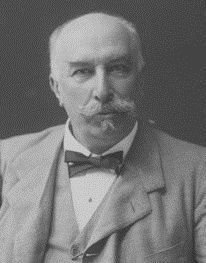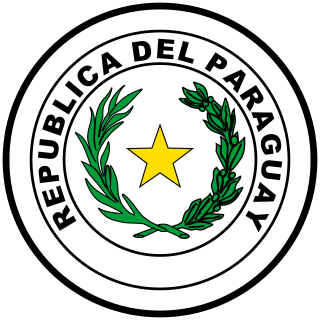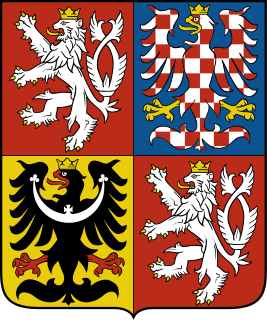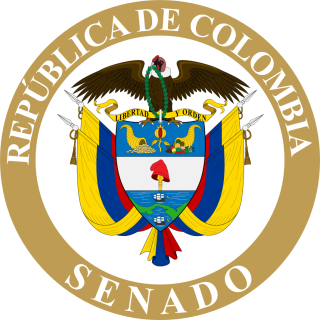The Autonomist Liberal Party, renamed usually semplified in Liberal Party in 1898, was one of major parties from 1910 until the Cuban Revolution the late 1950s, when it was exiled.
The Democratic Party is a center-right party in Bulgaria led by Alexander Pramatarski. The party is a member of the European People's Party (EPP).
The National Encounter Party is a political party in Paraguay.
The Liberal Party, commonly known as the Blue Party was a political party in Paraguay, ruling the country for most of the period between 1904 and 1940.
General elections were held in Luxembourg on 21 October 1945. They were the first elections held after the German occupation during World War II. As a result of the war, the political alliances of the interwar period had been ended. In their place were new parties; the Christian Social People's Party, the Luxembourg Socialist Workers' Party, and the Patriotic and Democratic Group in place of the Party of the Right, Socialist Party, and Radical Liberal Party respectively. It is regarded as a realigning election, as the election established the party political order, with four established parties, that would be maintained until 1974.

Parliamentary elections were held in Norway on 16 October 1933. The result was a victory for the Labour Party, which won 69 of the 150 seats in the Storting.

General elections were held in Belgium on 1 June 1958. The result was a victory for the Christian Social Party, which won 104 of the 212 seats in the Chamber of Representatives and 53 of the 106 seats in the Senate. Voter turnout was 93.6% in the Chamber election and 93.7% in the Senate election. Elections for the nine provincial councils were also held.

Parliamentary elections were held in Norway on 17 October 1927. The result was a victory for the Labour Party, which won 59 of the 150 seats in the Storting.

Parliamentary elections were held in Norway in 1891. The result was a victory for the Liberal Party, which won 63 of the 114 seats in the Storting. The Conservative Party and the Moderate Liberal Party contested the elections in an alliance, although separate lists were used in some constituencies.

General elections were held in Italy on 26 October 1913, with a second round of voting on 2 November. The Liberals narrowly retained an absolute majority in the Chamber of Deputies, while the Radical Party emerged as the largest opposition bloc. Both groupings did particularly well in Southern Italy, while the Italian Socialist Party gained eight seats and was the largest party in Emilia-Romagna. However, the election marked the beginning of the decline of Liberal establishment.

General elections were held in Paraguay on 10 May 1998. The presidential elections were won by Raúl Cubas Grau of the Colorado Party, who received 55.3% of the vote. In the Congressional elections, the Colorado Party won 45 of the 80 seats in the Chamber of Deputies and 24 of the 45 seats in the Senate, defeating the Democratic Alliance formed by the Authentic Radical Liberal Party and the National Encounter Party. Voter turnout was 80.5%.

General elections were held in Paraguay on 9 May 1993. In the country's first honest election, as well as the first with no military candidates since 1928, Juan Carlos Wasmosy of the Colorado Party won the presidential election. The Colorado Party remained the largest party in the Chamber of Deputies and the Senate, albeit with only a plurality. The opposition Authentic Radical Liberal Party and National Encounter Party held a majority of the seats in both chambers, later supplemented by the Colorado Reconciliation Movement which broke away from the Colorado Party. Voter turnout was 69.0% in the presidential election, 67.6% in the Chamber elections and 69.4% in the Senate elections.

Parliamentary elections were held in Bulgaria on 4 September 1911. The result was a victory for the People's Party-Progressive Liberal Party alliance, which won 190 of the 213 seats. Voter turnout was 47.2%.

General elections were held in Romania in June 1931. The Chamber of Deputies was elected on 1 June, whilst the Senate was elected in three stages on 4, 6 and 8 June. The result was a victory for the governing National Union, an alliance of the National Party, the National Liberal Party, the German Party, the Agrarian Union Party, the Vlad Ţepeş League, the Agrarian League and several other parties. The Union won 289 of the 387 seats in the Chamber of Deputies and 108 of the 113 seats in the Senate elected through universal vote. The five seats won by the Communist-dominated Peasant Workers' Bloc were ultimately invalidated by the new Parliament.

General elections were held in Romania in July 1932. The Chamber of Deputies was elected on 17 July, whilst the Senate was elected in three stages on 20, 24 and 26 July. The result was a victory for the National Peasants' Party-German Party alliance, which won 274 of the 387 seats in the Chamber of Deputies and 104 of the 113 seats in the Senate elected through universal male vote. Of the 274 Chamber seats, 265 were taken by the National Peasant's Party and nine by the German Party.

Parliamentary elections were held in Colombia on 16 September 1951 to elect the Senate and Chamber of Representatives. Although the Liberal Party boycotted the elections, some Liberals from the Populares faction did stand. As a result of the boycott, the seats reserved for the minority party were left vacant, whilst the Conservative Party won the remainder.

The Liberal Party, also known as the Radoslavists was a political party in Bulgaria from 1887 until 1920.

The National Liberal Party was a political party in Bulgaria.

The Liberal-Social Union was a political alliance in Czechoslovakia and the Czech Republic led by František Trnka.

The Agrarian Union Party was a political party in Romania.















